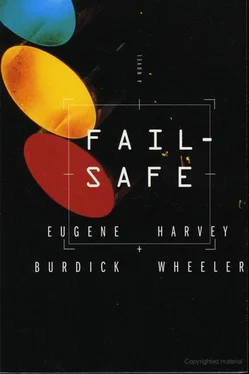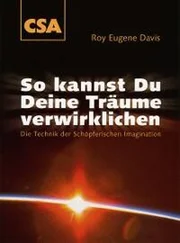Would Raskob ever go back to New York, General Bogan wondered? For no apparent reason he was sure that Raskob would. Not out of morbidity, but out of curiosity as to what the ruins would look like. And out of love for what had been. The ancient image of the Wandering Jew came to Bogan’s mind and under it a kind of caption: politician without a constituency.
The General shook his head to clear it of another man’s sorrow, only to find that it was his own.
In the Pentagon the heads swung toward Swenson when the President had finished speaking. Most of the people around the table knew that Swenson’s family lived in New York and that the headquarters of his business was also located there. Swenson’s face did not change expression.
“Are there any papers or documents in New York which are absolutely essential to the running of the United States?” Swenson asked. “And would there be time to get them out of New York, General Stark?”
“No-no, sir, there would not be time,” Stark said. He was having trouble with his voice. “There are a nuniber of irreplaceable documents in New York, but none of them are absolutely crucial for the running of the country. Of course, the records of a large number of private companies—”
“They will be able to rebuild without those papers,” Swenson interrupted. He looked sharply around the table for signs of revolt, cracking nerve, a break in the diain. What he saw he found reassuring.
Because time must be passed and the group might be called upon for further decisions, Swenson forced a discussion of steps that would be taken by companies to reconstruct the records that would be destroyed in New York. The conversation was bizarre. It was led by a man whose entire family might be burnt to death in a very few minutes and carried on by men who had not the slightest interest in the subject matter. But Swenson forced them to it, snapped roughly at the CIA man once, caught Stark in an error in logic.
Groteschele when he had heard the President’s words thought first of his family, but only briefly. Chiefly he thought of them because he had always heard that in emergencies men thought of their families. In Scarsdale they would probably escape the effects of the fireball and direct blast. If they survived that they would be able to go to the bomb shelter which Groteschele had bad built in their back yard.
Then, having done his duty toward family, Groteschele thought of his future. If both Moscow and New York were destroyed it would be the end of his present career. After such a catastrophe, triggered by an error which no one could identify, the world would not tolerate further discussion and preparation for nuclear war. Surely the great powers would disarm to a point below the level where such an accident could be repeated.
For a moment he felt a pang of theoretical regret. He really would have liked to see the thermonuclear war fought out along the lines which he had debated, expounded, and contemplated. It was not true, he told himself, that one fears death more than anything. One might be willing to die to see one’s ideas proven.
Then Groteschele swung his attention to what his future work would be. If there were drastic cutbacks in military expenditures many businesses would be seriously affected; some of them would even be ruined. A man who understood government and big political movements could make a comfortable living advising the threatened industries. It was a sound idea, and Groteschele tucked it away in his mind with a sense of reassurance.
He threw himself into the discussion about the reconstruction of records with zest. Swenson eyed him carefully and guessed almost exactly what had gone through Groteschele’s mind.
“Mr. Secretary, will there be any effort to warn the people in New York about the bombs?” Wilcox said.
Swenson looked sharply at Wilcox. When he spoke his voice was cold.
“That is the President’s decision, Wilcox,” Swenson said. “I assume he has discussed it with Premier Khrushchev and taken whatever action he considers appropriate.”
Stark looked at the Big Board. At one side of it there was a line of buttons, all of them glowing green. One of those buttons would have turned red if an air-raid alarm had been signaled or the Civilian Defense agencies had been alerted. Stark knew that Swenson also knew that, but that Wilcox probably did not.
“A lot of lives could be saved if people had even a few moments to take cover,” Wilcox said stubbornly. He was not a man who frightened easily. His voice was controlled and Swenson knew that he had nothing to fear on the score of Wilcox becoming hysterical. But the mood of the room was becoming what Swenson had anticipated but not found a few minutes before-that of an unbelievable tension, an eerie overcontrol.
Wilcox reached in his brief case and took out that day’s copy of The New York Times. He threw it on the table so that it slid to a stop in front of Swenson. Squarely in the center of the front page was a picture of the President’s wife. She was in New York for the opening of a new art center.
Everyone at the table except Swenson stared rigidly at the picture. The President’s wife was a beautiful woman who had captured the imagination of the American public as few other women in public life before her. With a simple elegance, she did a great many things: painted, dedicated children’s hospitals, wore handsome clothes, entertained the great and the powerful, traveled around the world representing her husband, and cared for her children.
Swenson looked sharply at Wilcox, then at the other men around the table. He had read a great deal about how people behaved under stress. One thing emerged from the studies: a group could stand a very high level of tension, of terror even, if they were certain that everyone in the group was equally exposed. Allow even the suggestion of preferential treatment and a composed group would disintegrate into a chaotic melee of desperate individuals.
Was Wilcox trying to suggest that the President’s wife would or should receive some sort of preferential treatment? Even officers as magnificently trained as those gathered in this room could be shattered if they thought that the President might be calling New York to get his wife out of the city.
“I don’t quite understand you, Wilcox,” Swenson said. “Make yourself clear and quickly.”
Wilcox’s finger went past the picture of the President’s wife and pointed at a story in the left-hand column of the Times. “CIVIL DEFENSE CHIEF STATES SURVIVAL RATE WOULD GO UP GEOMETRICALLY WITH TIME OF WARNING.” It was an article in which the Civilian Defense Director had issued a reassuring statement that with a few hours warning casualties in an all-out war could be cut drastically.
Swenson realized that Wilcox had not even considered the fate of the President’s wife. It had never occurred to him that the President would do such a thing as give prior warning to his own family.
Groteschele, Stark, and the CIA man all laughed simultaneously. It was a short, mirthless but relieving laugh. Swenson looked at them and smiled. Wilcox looked at the others in astonishment, then growing irritation.
“On very short notice an alert to a big city would probably do more harm than good,” Swenson said. “A couple of hours and people can be dispersed and moved. But with a couple of minutes warning all you would do is produce an enormous amount of panic, crowding of the streets, a frantic searching of parents for children, and the rest. Statistically, more people are in protected spots just before the alarm than they are right after it.”
Stark started to say something and Swenson looked at him and shook his head silently.
He knew what Stark was going to say: if four 20-megaton bombs are dropped on Manhattan no one is going to survive even if they are in the strongest bomb shelter made for civilian use. Of course, there would be a few exceptions-some technician at a hospital who happened to be in a room supplied with oxygen and surrounded by stout walls, some janitor in a deeply buried basement in which by some quirk he could suck in the sewer air and subsist on that for a few hours. But it would not be more than twenty or thirty people, Swenson felt sure.
Читать дальше











